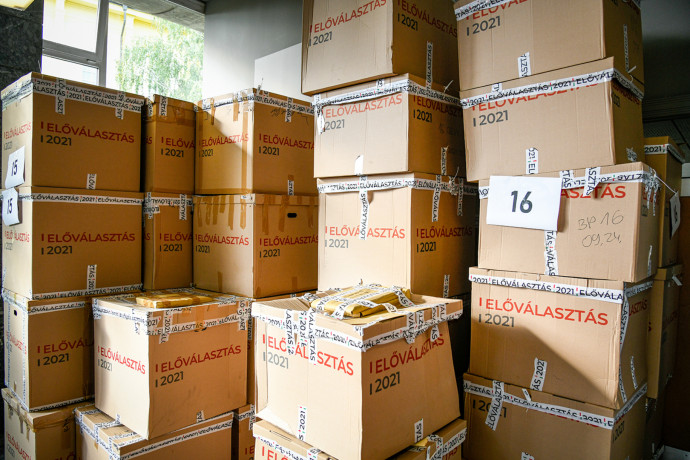Klára Dobrev wins first round of opposition primaries, Gergely Karácsony and Péter Márki-Zay still in the race

As revealed on Thursday night, Klára Dobrev, the prime ministerial candidate of Demokratikus Koalíció (Democratic Coalition, DK), won the first round of the Hungarian opposition's historic first primary race. This, of course, does not mean that Dobrev would be up against incumbent Viktor Orbán in the 2022 general elections, as she will be running against Gergely Karácsony and Péter Márki-Zay in the second round of the primaries.
Even though the week-long primaries were originally meant to start last Friday and end on Sunday evening, polls eventually closed only on Tuesday night after the IT system supporting the elections collapsed due to a cyberattack and a lack of capacities not long after voting began, forcing the opposition to delay the whole procedure by two days. Also, despite thousands of volunteers working late into the night on Tuesday and Wednesday, the count proceeded slowly. However, on Thursday evening, the final results of the primaries determining which candidates get to run in the 106 single-member constituencies and who gets to face Orbán at the 2022 general elections were officially announced.
Here are the key facts:
- All in all, voters had cast 616,512 valid ballots. Klára Dobrev (DK) received 214 319 votes, Gergely Karácsony (Párbeszéd) had 168 396, and 123 944 voted for Péter Márki-Zay. These three candidates will go on to the second round of the primaries, while Jobbik's Péter Jakab (86 909 votes) and Momentum's András Fekete-Győr (20 944 votes) failed to hit the necessary mark.
- Klára Dobrev appeared in the lead from the start of the count. Initially, it seemed as if the Budapest results might turn the election or at least diminish her lead. Still, even though Gergely Karácsony, Budapest's incumbent mayor, managed to win more constituencies in the capital, the adage rang true: Elections are won in the countryside. Dobrev ended up taking 85 of the 106 constituencies.
- Gergely Karácsony managed to win only in 15 constituencies, eleven of which were in Budapest and two more in surrounding Pest county. Karácsony is eager to defeat Dobrev in the second round and considers Péter Márki-Zay to be a key ally in achieving that, however, Márki-Zay set three conditions for withdrawing from the election: Introducing the Euro as soon as possible, calling the Orbán government to account, and declaring the invalidity of Hungary's Fundamental Law.
- Péter Márki-Zay ran on a much humbler campaign budget than the other candidates but still outperformed expectations. He came in third in the popular vote and managed two win in two constituencies. Speaking to the press, the Hódmezővásárhely mayor asserted that he thinks the opposition can't win in 2022 with Dobrev as the candidate for the top job, adding that her candidacy, with her husband, former PM Ferenc Gyurcsány in the background, only Fidesz would benefit.
- Péter Jakab ran a lively campaign but with disappointing results, as he only gained 14% of the vote. He managed to win four constituencies, and his performance was lacking even in regions where Jobbik traditionally has a strong base, like Borsod-Abaúj-Zemplén county, where Jakab mostly finished second behind Dobrev. However, the party's candidates did well in single-member constituencies.
- András Fekete-Győr, the prime ministerial candidate of Momentum, finished last of the five. His only consolation may be that many of his party's candidates will get to run in single-member constituencies in next year's elections. Similarly to Márki-Zay, Fekete-Győr also stated that Dobrev's candidacy would ensure that it would be impossible to win the election with Dobrev as the prime ministerial candidate.
- DK also won the most candidacies in single-member constituencies (32 candidates), followed by Jobbik (29). The Hungarian Socialist Party succeeded in 18 constituencies, Momentum took 15, while candidates of Párbeszéd and LMP will only get to run in 7 and 5 constituencies, respectively.
- While there were some really close races, there were more where one candidate won by a landslide. The most confident victory was in the 2nd constituency of Fejér county, where Jobbik's Attila Fazekas won by 91.17%.
- 20.75% of the candidates elected to run next year are women. The share of female MPs in the Hungarian Parliament is currently 13%.
- It is currently unclear when the second round of the race for the prime ministerial candidacy would be held; however, the opposition alliance is expected to make an announcement soon.
The translation of this article was made possible by our cooperation with the Heinrich Böll Foundation.